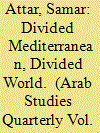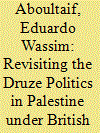|
|
|
Sort Order |
|
|
|
Items / Page
|
|
|
|
|
|
|
| Srl | Item |
| 1 |
ID:
161899


|
|
|
|
|
| Summary/Abstract |
Divided Mediterranean, Divided World: The Influence of Arabic on Medieval Italian Poetry describes the significant role played by Arabic and Islamic poetry, legends, tales, and philosophy on major Italian poets in the Middle Ages in spite of the denial of some of the poets themselves of such an influence. Psychologists do not seem to pay much attention to the love–hate syndrome that affects sensitive souls in politically unstable states. Similarly, many literary critics continue to turn a blind eye to the influence of Arabic on Medieval Italian poetry. Historians also present history to us not only through documents they have read in archives, but they similarly express their own divergent personal opinions and interpretations of historical events.
|
|
|
|
|
|
|
|
|
|
|
|
|
|
|
|
| 2 |
ID:
161900


|
|
|
|
|
| Summary/Abstract |
Scholars in Arab post-colonial literature have spoken of the lure of the West for immigrants in terms of the West's superiority of education, technological development, military prowess, political weight, and economic clout. Sudanese novelist Tayeb Salih presents a different, but not inconsistent, narrative: his novel Season of Migration to the North suggests that the lure of the West, in the case of England, consists in its accommodation of emotional distance. Even though Tayeb Salih's literary work acknowledges the role of emotional detachment in undermining the notions of community, home, and integration, Season asserts that emotionlessness is the source of gratification for the transnational protagonist Mustafa Sa'eed. In so doing, Season argues against the immigrant and transnational notion of emotional apathy being a source of pain for diasporic subjects. Mustafa Sa'eed's lack of emotions allows him to interact with the fiction of West through embodying Oriental and other performances. The protagonist's emotional detachment from English society, its women, and preconceived notions about the Orient, paradoxically, enables him to derive pleasure from his physical trysts, nomadism, anti-colonial revenge, and pretend play.
|
|
|
|
|
|
|
|
|
|
|
|
|
|
|
|
| 3 |
ID:
161901


|
|
|
|
|
| Summary/Abstract |
There is an established literature which argues that the Druze of Palestine were either neutral during the Colonial period or supportive of the Zionist Agency and its plans. The aim of this research is to counter the Zionist narratives that promote the concept of Druze–Zionist cooperation. I argue that the Druze were supportive of the Palestinian-Arab cause, and they heavily participated in the anti-colonial activities of the Palestinians, politically and militarily. Their military participation was manifested in their participation in the events of 1929, 1936, and 1948. Politically, Sheikh Amin Tarif led the community in their stance against Zionism. This research will provide a new account and narrative for the Druze role in the events in mandatory Palestine, revealing their supportive stance to the Palestinian national struggle.
|
|
|
|
|
|
|
|
|
|
|
|
|
|
|
|
|
|
|
|
|